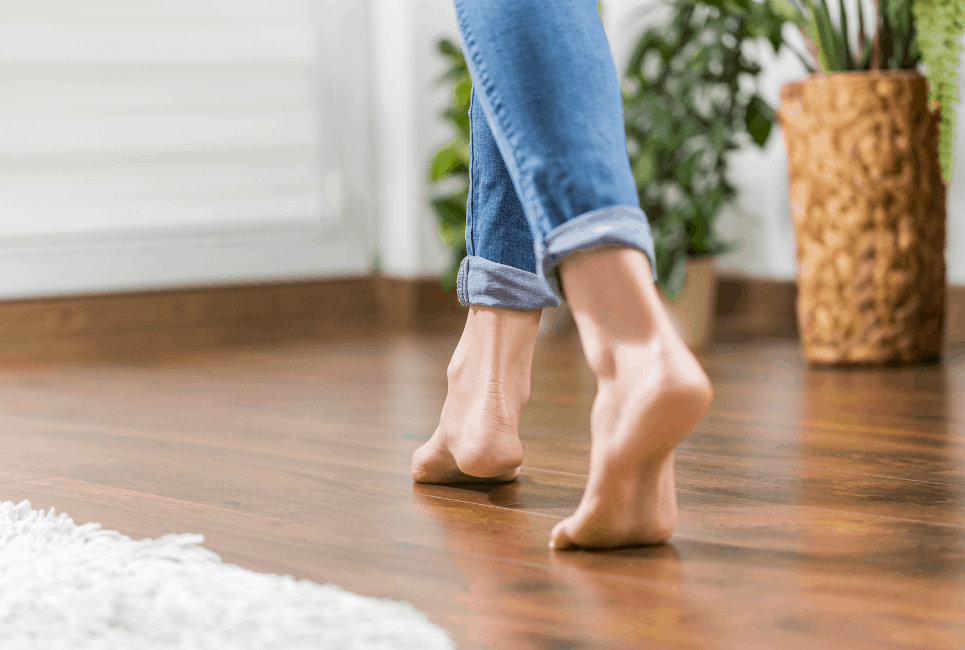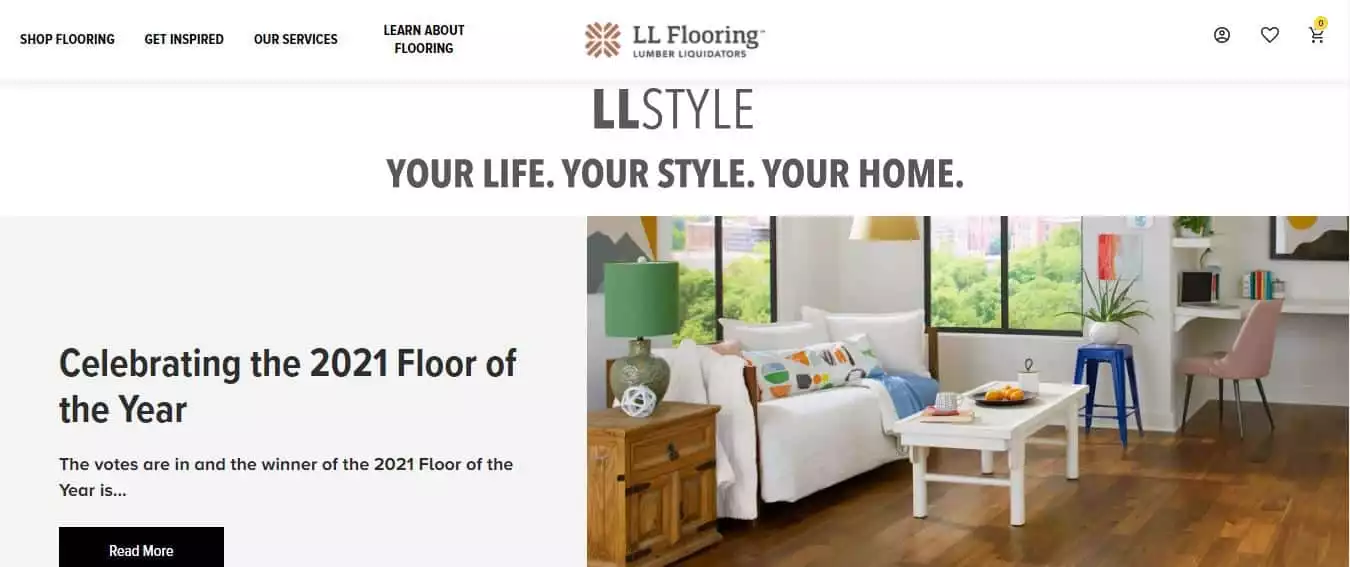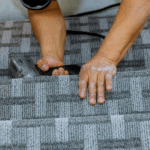- LL Flooring Review: Should You Buy From There? - June 25, 2022
- Grizzly G0771Z Review: Do We Recommend? - June 25, 2022
- Micrometer vs Caliper Compared: Which Measurement Tool Should You Buy? - June 25, 2022
Most people want the floors in their home to be durable and visually appealing, and vinyl flooring materials usually meet both of these requirements. However, it is necessary to compare LVP vs EVP flooring to understand which of these two types of vinyl flooring looks better and lasts longer.
LVP and EVP flooring solutions have a lot in common regarding how the materials are structured and how they look once they’re installed. They are also among the most popular types of flooring because they are affordable and capable of withstanding high amounts of pressure.
EVP can be regarded as a more rigid and durable version of LVT, but both vinyl flooring types are an affordable alternative to hardwood flooring.
This LVP vs EVP flooring comparison will clarify the differences between these two flooring options and help you decide which one is a better choice for you.
Main Differences Between EVP vs LVP Flooring
The main differences between EVP vs LVP flooring are:
- EVP flooring has a rigid core, whereas the LVP flooring tends to be more flexible
- EVP flooring can be installed in the same way as the laminate flooring, whereas LVP flooring needs to be glued down to the subfloor
- EVP flooring is better suited for high traffic areas, whereas LVP flooring is a good choice for bedrooms or rooms that don’t see a lot of traffic daily
- EVP flooring is waterproof, whereas LVP flooring is water-resistant
- EVP flooring isn’t affected by considerable oscillations in the room temperature, whereas LVP flooring doesn’t handle sudden temperature changes well
Key specifications
| LVP flooring | EVP Flooring | |
| Hardness | Moderate | High |
| Water resistance | Water-resistant | Waterproof |
| Top layer type | Wear layer | Clear protective layer |
| Weight | 2 – 2.3lbs per square foot | 2 – 2.3lbs per square foot |
| Impact and scratch resistance | Good | Excellent |
| Life expectancy | 10 to 20 years | 15 to 25 years |
| Latest price | Check the latest price | Check the latest price |
Examining the features of LVP and EVP flooring
LVP flooring

Luxury vinyl planks became an alternative option for natural flooring materials in the 1970s because of their ability to handle pressure well. This flooring material is usually a replica of hardwood that is much thinner than solid wood flooring.
Vinyl flooring models that mimic the look and feel of stone are referred to as LVT or luxury vinyl tiles. Check out our guide to the best tile flooring options to find their advantages over vinyl flooring solutions.
It is worth pointing out that most LVT and LVP flooring solutions have similar properties as they are made from the same materials and have the same internal structure. LVP flooring is usually flexible, and it requires the preparation of the subfloor surface before installation.
The flexibility is why this flooring material isn’t an ideal option for uneven floors, as it reveals the imperfections of the subfloor surface.
Hiring professional floor installers is recommended even if you’re a skilled DIYer because the installation process requires you to create a surface onto which the LVT flooring can be placed. Read our guide to the best types of wood flooring if you think that vinyl flooring solutions aren’t the right choice for you.
Key features
- Good resistance to scratches and damages
- Wide selection of styles and designs
- LVP is much thinner than other flooring materials
- Temperature changes affect the material
- Most LVP flooring options have a core that is made of cork
- Moderate amounts of water won’t warp the material
- Low maintenance requirements
- One of the least expensive flooring materials on the market
Visual appearance
Laminates and LVP flooring have a few things in common. When viewed from a distance, they look like a natural flooring material, but a closer look reveals their artificial nature. Both of these flooring materials owe their appearance to the photographic layer that defines their look. You can choose between thousands of different models that mimic the visual style of hardwood floors.
Some models can have a texture that matches the photographic print pattern and makes the hardwood replica more convincing. Luxury vinyl planks are between 2 and 8mm thick, making them thicker than most standard vinyl flooring options.
You should bear in mind that the thickness of the LVP flooring depends on a model and determines how much pressure the material can take.
Structure and hardness

Despite some variations, the structure of LVP flooring models is the same. The top or wear layer contains a protective coating that prevents scratches or damages caused by impact. Most manufacturers use advanced printing techniques to create the image layer that is located underneath the wear layer.
The core of LVP flooring is usually made of cork that causes the material flexible and adaptable to different surfaces. You will find a backing layer made of EVA foam at the bottom of LVP flooring. This layer makes the material more stable and allows it to create a firm bond with the adhesive.
The hardness of LVP or any other type of vinyl flooring isn’t measured in the same way as the hardwood flooring’s hardness. Ultimately, the durability of LVP depends on the thickness of the top layer. At the same time, the material from which the core is made determines the model’s capability to withstand prolonged exposure to water.
Other noteworthy features
For a long time, the only way to install LVP was to glue it to the subfloor, but in recent years manufacturers started producing models that can be floated over different surfaces. These models have a Tongue and Groove installation mechanism that enables you to assemble vinyl planks without adhesive. However, you will have to glue the LVP flooring you choose to the subfloor in most cases.
Installing LVP over an existing floor is usually impossible if you have to glue the material to the subfloor. Consequently, the previous flooring has to be removed, and the surface needs to be prepared for the installation of the LVP flooring.
Reliability
Even though they resist damages well, LVP is not the most durable flooring option on the market, as they can last for ten to twenty years.
However, they are considerably less expensive than other flooring solutions, making them an excellent investment for homeowners who don’t have a budget for hardwood flooring. Keeping an LVP floor clean doesn’t take too much time or effort since you just have to mop it and vacuum clean it regularly.
You should keep in mind that LVP flooring isn’t a great fit for bathrooms and other areas where it might be exposed to large quantities of water because its core isn’t fully water-resistant. Go through our COREtec flooring guide if you want to get LVP flooring for your project.
EVP flooring

EVP flooring is a subcategory of LVP flooring that is developed with the aim of improving the features of the original luxury vinyl planks. The term EVP stands for engineered vinyl planks and it is used interchangeably with the term rigid core vinyl flooring.
The cores of EVP and LVP flooring aren’t made from the same materials, which affects their ability to withstand high amounts of traffic or prolonged exposure to water. Also, the selection of EVP flooring models is wider than the selection of LVP flooring options.
Despite these differences, LVP and EVP flooring solutions have similar features, so you should regard EVP as an upgraded version of LVP. Unlike the LVP flooring, EVP is eco-friendly because recycling it isn’t too difficult. Even so, some models may emit volatile organic chemicals for weeks after they’re installed. The so-called VOCs can cause respiratory problems if they are inhaled for a long time.
Key features
- Upkeep doesn’t take much effort
- Simple and quick installation process
- EVP can’t be damaged by water
- Suitable for residential and commercial settings
- A convincing replica of hardwood
- A broad spectrum of textures and designs
- Replacing EVP is easy
- Not sensitive to sudden changes of room temperature
Visual appearance
The versatility of available options is one of the most significant advantages engineered vinyl planks have to offer, as they match all types of home décor. Like LVP, the EVP flooring options contain a photographic layer that usually mimics hardwood’s visual properties.
Also, some models can have a texture that adjusts to the printed patterns to make the illusion even more realistic. EVP flooring models are thicker than LVP models, as their thickness varies between 3mm and 8mm. As a result, EVP flooring generates less noise and feels warmer when you step on it than the LVP flooring. You don’t have to glue EVP flooring to the subfloor because all models can be floated over different types of surfaces.
Hence, there’s no need to remove the old floor before installing EVPs, which shortens the duration of your flooring project significantly. This flooring material can reduce your flooring project’s costs, especially if you choose the right time to buy it.
Structure and hardness
The critical difference between LVP and EVP isn’t visible because it is located in the lower layers of these vinyl planks. Both flooring types have a multi-layered structure that consists of a transparent wear layer, an image or decor layer, and an optional structural backing layer.
The vinyl core and rigid core layers you can find in EVP flooring aren’t included in the LVP flooring structure. Furthermore, depending on the materials used to create the rigid core layer, you can differentiate between SPC and WPC flooring solutions.
The rigid core layer of SPC or stone plastic polymer and WPC or wood plastic polymer contains slightly different materials, affecting their durability, stability, and thickness.
Both WPC and SPC contain calcium carbonate, plasticizers, and polyvinyl chloride, but the WPC core also has wood flour and a foaming agent. That’s why the thickness of a WPC plank is between 5.5 and 8mm, while an SPC plank’s thickness varies from 3.2mm to 7mm.
Other noteworthy features

The purpose for which you’re planning to use EVP will help you determine which of the material’s subcategories you should choose. Despite the differences, both SPC and WPC planks are waterproof and more resistant to damage or scratches than most types of hardwood.
Each EVP flooring model comes with a Tongue and Groove installation mechanism, making this flooring material a popular choice for DIYers who want to install flooring on their own. This material is a great choice for high traffic areas because its wear layer usually around 25 to 30 mils, while the maximum thickness of the wear layer on LVP flooring is 20 mils.
Reliability
The rigid core vinyl flooring has excellent soundproofing capabilities, it is incredibly stable and entirely waterproof. Its thick wear layer protects the material from scratches, while its multi-layered structure enables it to withstand high amounts of pressure.
EVP flooring is more expensive than LVP, as its price is similar to laminate flooring options. All versions of this vinyl flooring type are a great investment that will remain in perfect condition for years. There are no special maintenance requirements as the material allows you to remove dust or dirt quickly.
The material is softer than hardwood or other flooring options, which makes it more comfortable to step on.
LVP Flooring – Pros and Cons
Pros
- Resistant to scratches and moderate impacts
- Huge selection of textures, patterns, and designs
- Low upkeep requirements
- Less expensive than most flooring materials
Cons
- Limited soundproofing capabilities
- Some models have to be glued to the subfloor
EVP flooring – Pros and Cons
Pros
- A thick wear layer protects the material from damage
- Quick installation process over the existing floor
- The rigid core layer makes the material waterproof
- Excellent thermal insulation features
Cons
- Won’t fit perfectly onto an uneven surface
- WPC and SPC planks may contain high levels of VOCs
The best alternatives to LVP and EVP flooring
Despite their popularity among professional contractors and homeowners, vinyl flooring solutions have several downsides. Some models are ill-suited for basements or kitchens because they can warp if the room is flooded.
Besides, neither of the available vinyl flooring solutions increases the property’s value as they aren’t considered to be as durable and stylish as other types of flooring. All of these factors may prompt you to search for alternative flooring options.
We’ve shortlisted several of the best alternatives to LVP and EVP flooring so let’s take a closer look at their features.
Laminate flooring

LVP and EVP flooring solutions resemble laminate flooring, even though they are made from different materials. Both types of flooring are referred to as fake wood because they simulate the visual properties of hardwood flooring options.
Like all types of EVP flooring, laminate doesn’t require the application of adhesives during the installation process, as each plank features an installation mechanism that enables you to piece them together.
Laminate flooring features several layers that offer protection against damages, but its water-resistance capabilities are somewhat limited as lower layers can be damaged if they get in contact with water.
Engineered hardwood flooring

It is virtually impossible to distinguish between hardwood and engineered hardwood flooring just by looking at it. The reason for this is the veneer that is located at the top of a plank made from engineered hardwood.
The veneer, made from solid wood, is glued to the supporting layer that is usually made of plywood. Engineered hardwood flooring is capable of withstanding high amounts of pressure, which makes it suitable for both low and high-traffic areas.
It is also considerably more durable than LVP or EVP flooring, as its expected lifespan is close to 40 years. Go through our engineered hardwood vs laminate comparison if you want to find out more about these flooring materials.
Tile flooring

Tile flooring is considered a conventional choice for areas like kitchens, bathrooms, or hallways. The material’s resistance to water, scratches, or other types of damages makes it a foolproof choice for either of these areas in your home.
However, the installation process can be difficult, so you shouldn’t choose this material for your DIY flooring project if you haven’t gone through it before. Tile flooring can be cold, and you may have to install a floor heating system if you live in a cold climate region.
The material can be slippery, which makes it a poor choice for families that have children or pets.
Frequently asked questions about LVP and EVP flooring
Answer: LVP flooring needs approximately 48 hours to acclimate, so you should make sure that the material arrives at your home at least two days before installation.
Answer: Daily sun exposure is going to decolorize the LVP flooring, but it won’t cause structural damage.
Answer: Yes, you can because the material doesn’t need time to acclimate. In addition, EVP flooring won’t expand or contract due to the properties of the materials that are used to make its core.
Answer: On average, you’ll have to pay between $3 and $4 for a square foot of rigid core vinyl flooring.
Our verdict: Is LVP flooring as good as EVP flooring?
Striking a perfect balance between cost and quality can be difficult while choosing flooring materials. Vinyl flooring is probably one of the most cost-efficient flooring options you can get because it is less expensive than most flooring materials and it is relatively durable.
LVP is among the cheapest flooring option you have at your disposal, but the installation process can be challenging if the model you choose can’t be floated over or glued to an existing floor.
The EVP flooring is an upgraded version of the luxury vinyl planks that mimic the visual properties of hardwood flooring more accurately. It is also more durable, waterproof, and easier to install.
Each of these features makes EVP flooring a better option than LVP flooring. Which of these types of vinyl flooring are you going to choose?
Let us know in the comments or continue reading our LL Flooring vs Home Depot comparison if you’re not sure where to buy vinyl flooring for your next project.
There are plenty of budget generic flooring options, but for higher quality (and sometimes harder to find) premium flooring LL Flooring is a step up. Best of all, you can browse online for selections you may not find in your local Home Depot and have them safely delivered to your residence or job site.





